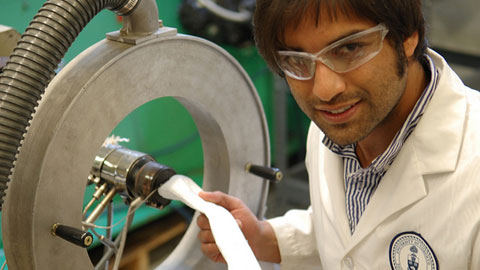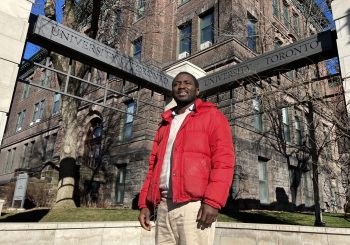When it comes to washing dishes, the verdict may be out for “sponge versus washcloth” – but for cleaning oil spills, engineering PhD student Ali Rizvi (MIE PhD 1T4) is all sponge.
Rizvi has designed a cost-effective commercial sponge, similar to the one you’d find in your kitchen sink, which can be used in disastrous oil-spill cleanups. Using light foam, it absorbs 24 times its weight per gram in oil, and doesn’t absorb water.
Rizvi’s research and entrepreneurial acumen recently had him named as one of the “Top 30 under 30 Future Leaders in Manufacturing” by the Society of Manufacturing Engineers (MSE). The prestigious title recognizes exceptional talent and leadership in science, technology, engineering or mathematics (STEM).
Conducting his research under the supervision of Professor Chul B. Park (MIE), Canada Research Chair in Microcellular Plastics, Rizvi’s sponge technology involves a manufacturing method that is inexpensive and easy to scale.
“I pursued manufacturing engineering to facilitate the commercialization of scientific breakthroughs. If a product cannot be mass manufactured cost effectively, it will fail,” said Rizvi.
In 2013, Rizvi received funding from VentureStart through the Research & Innovation Commercialization Centre, which supports entrepreneurs in STEM fields in southern Ontario. The seed funding helped support his startup, Flarian Inc., where he is co-founder and director of manufacturing.
“Ali Rizvi is an inspirational researcher and entrepreneur, and I offer my heart-felt congratulations for this tremendous honour,” said Dean Cristina Amon. “His early career achievements demonstrate the remarkable innovation and impact of U of T engineering students as they tackle some of the world’s most pressing challenges.”
In addition to creating a sponge that outperforms others in the market, Rizvi is also working on a proposal to design a device – similar to a mobile phone – that can diagnose tuberculosis in remote, electricity-free areas in third world countries.
Among his recent recognitions, Rizvi is a 2013 recipient of the NSERC Alexander Graham Bell Canada Graduate Scholarship. In 2012, he received the Queen Elizabeth II Graduate Scholarships in Science and Technology (QEII – GSST), DuPont Canada Scholarship in Science and Technology and was awarded the Society of Plastics Engineers (SPE) PerkinElmer Award Composites Division for best paper.
Read more about Rizvi at the Society of Manufacturing Engineers website.



